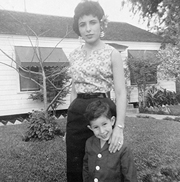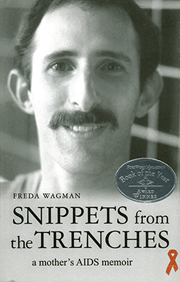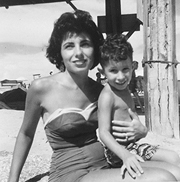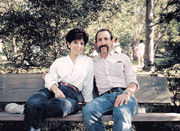‘Snippets from the Trenches’ tells the story of AIDS in Houston
By Brandon Wolf
See also What Readers Are Saying
“Sometimes I think we know each other so well, and yet we both keep growing, so there’s ever more knowing to be done. This book is about dying, a lot about dying, but it is even more about living — the meaning of it, and in particular, it is about knowing self.”

This is Gary Wagman’s 1985 inscription to his mother, Freda, in a copy of Shirley MacLaine’s
Dancing in the Light. Little did he know that 12 years after his death from AIDS, Freda would write Snippets from the Trenches: a Mother’s AIDS Memoir, a book about growing, dying, living, and knowing self.
_________________________
“I wrote it the way I lived it,” says Freda Wagman. And the way she lived it has an amazingly familiar ring to people who lived in Houston during the first decade and a half of the crisis. Snippets from the Trenches starts in 1981 and recounts the last 14 years of her son’s life. It also traces the evolution of both the disease and Houston’s response to it. Familiar names pop out of the pages: Michael Wilson, Sue Lovell, Michael McAdory, Dr. Robert Awe; organizations such as AIDS Foundation Houston, Montrose Clinic, Stone Soup, People with AIDS Coalition, Montrose Counseling Center, and Bering United Memorial Church.
Gary Wagman was living in San Francisco in 1983 when he phoned his mother to tell her he had a swollen lymph gland on his neck and planned to visit a doctor to have it diagnosed. When medical tests confirmed that Gary was HIV-positive, Freda Wagman flew to San Francisco to be with her son. On her return to Houston, she determined to find out everything she could about HIV. Rather than turning to books, Wagman joined a small group of volunteers who were organizing to meet the crisis head-on. The volunteers worked under the auspices of the KS/AIDS Foundation (now AIDS Foundation Houston).
Wagman immersed herself in the effort, and AIDS quickly became a part of her daily life. She worked with those living with HIV, their partners, and their families. She became familiar with hospitals and medications. She was authorized as a notary public to help attest to the authenticity of legal documents. She attended funerals and memorial services. She comforted those whose families abandoned them. She offered support to relatives who struggled to deal with a loved one’s impending death.
Meanwhile, Wagman herself was struggling. Her son was living nearly 2,000 miles away. She took advantage of any opportunity to visit him in San Francisco or to accompany him on vacations either at home or abroad. And she continued her volunteerism over the next decade, remaining physically and emotionally strong for others.
But loss is deeply personal, and in 1993 Wagman began to prepare for her own private pain by joining the HIV Support Group at Bering Memorial Methodist Church. In late 1994, Gary took sick and began a steady decline. In April 1995, he died in her arms.
A Message to Tell
“The book came in starts and fits,” says Wagman. “There was no epiphany.” A series of factors eventually accounted for the book’s completion. The first of those factors was an invitation, about six months after her son’s death, to speak to a group at Rice University. She wrote a short speech, and that speech is now the foreword in the book.
The speech resonated with many people, and she received encouragement to expand it into a book. “I thought people had to be kidding,” Wagman says. “I’d never written anything in my life, except for that short speech. But I was left with a thought that kept running through my mind.”
Wagman continued to attend the Bering Support Group after Gary’s death. She also continued to work on the book, sometimes putting it away for long periods of time. The book was about half finished, but not moving forward, when she became friends with a young man in the support group who enjoyed attending social and art events with her. “One day I called and asked him to go to the Museum of Fine Arts,” she says. “He told me that I had to start spending an hour or two working on the book before he would accompany me to an event. I liked his company, so I eventually finished the book.”
 In 2007, Snippets from the Trenches was published. In 2008, it won a Foreword Magazine Book of the Year Award in the Gay & Lesbian category.
In 2007, Snippets from the Trenches was published. In 2008, it won a Foreword Magazine Book of the Year Award in the Gay & Lesbian category.
The Author’s Own Journey
Wagman’s personal story starts with her birth in Toledo, Ohio. She was the eighth of nine children born to Russian immigrant parents who met while working for the Jewish National Fund.
The family was poor, so they moved to Detroit, Michigan, where her father could get work in the auto factories. Wagman’s father worked there for many years as a tool and die maker. At the beginning of her senior year in high school, she moved to Houston and has lived here since.
Wagman’s first job was as a typist at the Jewish Community Center. Next, she worked for more than a decade for Walter Pye’s, a high-end apparel shop. She remembers Walter Pye Sr.: “He was a real gentleman. And he owned a fabulous pink Cadillac convertible.”

From Walter Pye’s, she took a position in the offices of Beth Yeshurun Synagogue, followed by the post of secretary to the chairman of the Chemical Engineering Department at the University of Houston. Finally, she settled into a longtime position as vice president of administration for a store-planning firm.
Wagman ran the business end of the firm. She supervised the payroll, accounting, bookkeeping, insurance, and mail operations. “I ran it like a top,” she says with pride. “We never missed an IRS deadline and never issued a hot check.”
Bringing Up Gary
Wagman married young and reared
one child, her son Gary; her second pregnancy ended in miscarriage. Wagman’s husband was a commercial artist. Years later she would marvel at the ironic location of her husband’s office—the building that in the 1980s became McAdory House, where she sometimes worked as an AFH volunteer.
After 10 years of marriage, Wagman and her husband mutually agreed to a divorce. “Gary’s father was a jock,” Wagman says, “but Gary was a very gentle soul. They eventually began to have disagreements, and their arguments had become more and more frequent. He didn’t miss his father.”

Wagman remembers Gary as a typical child, sometimes given to the unexplainable mischievousness of youth. “Once he got in trouble for riding his bike through the halls of the local school after hours,” she says. “Another time, he filled his pockets with root beer candies at a convenience store. But he was always apologetic, and I think we formed a bond because I didn’t come down hard on him for such infractions.
“Gary was also a loner,” Wagman recalls. “He stayed in the house a lot and asked me to play games like stadium checkers. He also liked to turn chairs over so the top of their backs touched, and then he would put a sheet over them. He had a little stuffed rabbit that he would take in there with him, and sometimes he would invite me in too.”
Wagman describes her son as a smart student and a good boy. “He was never sick and never missed a day of school,” she says. After graduation from Bellaire High School, he tried his hand at a triple major of math, anthropology, and French at the University of Texas. He entered as a sophomore with advanced placement.
But Gary became restless with his studies in Austin and worked to pay his way to Israel, where he lived for an extended time with a relative. Shortly after returning, he offered to help his mother process the payroll at her office one holiday weekend.
“He picked up a programming book for the office computer, and with no training, he wrote the code for a payroll program so I wouldn’t have to do it by hand,” Wagman remembers.
With a newfound interest, Gary went to the University of Houston and graduated from their computer sciences program. He accepted a job offer with Shell Oil in New Orleans, but his sights were set on San Francisco. Before long, he found a programming job at the University of California at Berkeley. “I knew at that point in our lives that I had to let my little bird fly,” Wagman says. “He was never happier than he was in San Francisco. It was his city. And for him, it was magic.”
Reflecting on her relationship with her son, Wagman says, “We were close. We were pals. We were on the same wavelength. We were each other’s teacher. I felt like I was winging it the whole time as a mother. But I must have done something right, because he grew up to be a very honest and caring person.”
Gary came out to his mother when he was attending school in Austin. “He wrote me a letter,” Wagman remembers. “I was out having dinner at Ruggles the day the letter came. I got home late, read the letter, and called him. The poor kid had to be in class the next morning, but we were on the phone from 11 p.m. until 2 a.m. I asked him if he was sure, and he said yes. It didn’t shock me because I had sort of thought for the last three years that he might be gay. But now it was black and white.”
Learning Amidst Sorrow
A book about AIDS and a son’s death could easily have wandered into sentimentality and justifiably portrayed Wagman as a saintly mother. But she chose to do neither. Instead, she recounts her experiences with the eye of a neutral observer, searching for whatever lessons can be learned. She preferred to be a peer and friend with those around her rather than slipping into the role of a maternal angel of mercy.
Wagman became friends with the gay men who were fellow volunteers. She accompanied them to gay discos, joined them in the pews at memorial services, and helped “de-gay” apartments before out-of-town parents arrived. She once declined an invitation to an AIDS fundraiser at The Ripcord, Houston’s notorious leather bar, but then agreed to attend when her friends insisted. “I did think it a bit strange though when a lesbian activist offered to strip topless that night for a $100 donation,” she laughs. “Before I knew it, the gay audience came up with the money and I saw her prancing across the stage with no blouse or bra, as the men in attendance cheered her on.”
There are many moments in Wagman’s book where the reader finds their eyes misting over and their throat catching. But there are light moments, too—such as the memory of an office manager who called an AIDS hotline, frantic because he had just learned that an employee had been diagnosed with HIV. “What should I do with all the office files?” he asked. The phone volunteer later regretted not saying “Burn them!”
Wagman says she stared bigotry in the face too often, such as she witnessed at the funeral of a young black woman who had succumbed to AIDS. “The preacher kept pointing down at her in the casket and yelling about her sins and their consequences,” she says. “Even her family was saying amen.” Yet the author remains more baffled than judgmental.
And she remains decidedly human. She frets over accidental slips of the tongue while in the presence of the terminally ill, finds her patience running short with an irritating roommate, and wonders why she is depressed when it’s everyone else around her who is dying. But it is that humanness—and her conversational writing style—that draws readers into her book.
In retrospect, Wagman says that neither she nor the volunteers with whom she worked ever asked anyone how they got AIDS. “Because it really didn’t matter,” she says. “Despite the fact that some parents condemned or abandoned their children, those responses never occurred to me as options. I only knew that Gary was my son, and that I loved him.”
A portion of the proceeds from the sale of Snippets from the Trenches will be donated to various AIDS organizations. The book may be purchased through Amazon.com, where a downloadable copy via Kindle will also soon be available. For a signed copy, contact the author at [email protected].
Brandon Wolf interviewed Acadian Bakers’ Sandi Bubbert in the April issue of OutSmart .
_________________________
What Readers Are Saying
“Freda Wagman has told the forgotten story of how Houston responded to AIDS. I had to read this book in small portions, because it was painful to remember those days—I lost my own brother to the epidemic. But I am proud to have been a part of those efforts, and I am proud of those with whom I worked.”— Sue Lovell , Houston City Council member
“Freda Wagman has written a compelling piece reminding us of both the tragedies and triumphs of a desperate period in the life of the gay community in Houston and all of the country. Her vivid account brings to life the highly personal experience of those who so bravely rose to the ? crushing needs. ? It was a time when the only hope for thousands rested in the hands of a few kind and loving people who were brave and compassionate enough to ? care for desperate ? people abandoned by most. ? Freda tells this ? heart-wrenching story in a way so compelling ? as to make it difficult to put the book down. ? Her writing is colored by the love and angst of a mother soon to lose her beloved ? son, ? a mother whose only refuge from personal pain was to care for others in ? great need.” ?— Tony Carroll, LCSW (licensed clinical social worker)
“The book really takes you back in time when the pervasive impact of HIV was in the gay community. Freda accurately and poignantly captures the emotion of that era.”— Patty Armstrong, AIDS Foundation Houston (AFH) employee for over 19 years, and current AFH chief operating officer
“In Snippets from the Trenches , Freda describes the courage and tenaciousness of numerous individuals and families she came to know as a hospital and home-visit volunteer. The stories are riveting examples of love, compassion, hope, and perseverance in the face of tragedy. Freda’s description of her close relationship with Gary and the emotional struggles she faced while dealing with Gary’s illness is very moving. Although Gary died in April of 1995, Freda’s ongoing work to help those affected by AIDS is a loving memorial to her son.”— Linda Bratsen, Houston PFLAG
“It is gratifying to see that Freda Wagman addresses the mental-health toll that HIV/AIDS takes on both persons living with the disease as well as their partners, friends, family, and loved ones. It was and still is a privilege to be associated with other Houston organizations who mobilized in the early days to address the physical and emotional needs of our community.”— Ann J. Robison, PhD, executive director, Montrose Counseling Center
To see a promo on YouTube for Snippets, go to http://www.youtube.com/watch?v=d8D1c0C4-DM.
Want an autographed copy of the book? There will be a book signing at Half-Price Books 1011 Westheimer on Friday, May 22, from 6-9 and Saturday, May 23 from 1-4 pm.











Comments